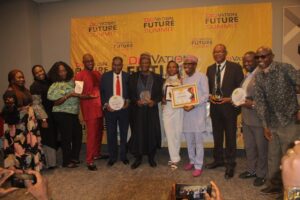Many Governors and agencies have continued to reiterate their commitment to Nigeria’s digital economy agenda being championed by the Ministry of Communications and Digital Economy. Some such Governors are Abdullahi Sule, Governor of Nasarawa, Babajide Sanwo-Olu of Lagos State, including the National Information Technology Development Agency.
While speaking at the Future Summit, organised by Digivation Networks in Lagos, these Governors and organisations highlighted some of the activities they carried out in their own state to make sure the digital economy flies.
With the theme: ‘Future Now’ they emphasise the need for digital skills.
According to Mr. Olatubosun Alake, SA Innovation and Tech to the Lagos State Governor, who represented the Lagos State, to drive a digital economy, a collaboration between the private and the government in an effort to have pervasive broadband that can be leveraged by Nigerians across the country is needed.
He said that is why Lagos State is building infrastructure across the state to encourage investment that will ultimately bring connectivity. “Lagos State is aware of what it means to have a digital economy, as a result, we are investing in infrastructure and human capital,” he said.
On his part, the Nasarawa State Governor disclosed the state he governs has already keyed into the Digital Economy by making sure all the state’s activities are carried out leveraging digital platforms.
Speaking on behalf of the Governor, the Director, Strategic Communications Office of the State, Mal. Yakubu Lamai, noted that Nigeria is presently doing well in terms of digital preparedness.
 “Judging by the position we occupied some years ago, it will be safe to say we are gradually moving forward digitally as a country,” he said, arguing that the government has been able to galvanise its youthful generation to embrace technology, which is return creating jobs and wealth for many Nigerians.
“Judging by the position we occupied some years ago, it will be safe to say we are gradually moving forward digitally as a country,” he said, arguing that the government has been able to galvanise its youthful generation to embrace technology, which is return creating jobs and wealth for many Nigerians.
For the Director-General of National Information Technology Development Agency (NITDA), mal. Kashifu Inuwa, digital skills remained, even as it is predicted that 60% of the global GDP will be digitized by 2022 and that over the next decade, digital platforms will be used to create close to 70% of the value.
Mal. Inuwa, who was represented at the summit by Dr. Aristotole Onumo, Director, Corporate Planning and Strategy at NITDA, said this is why NITDA in collaboration with other stakeholders is working to have the majority of citizens in Nigeria acquire more specialized digital competencies.
“As a government agency mandated to build IT capacity for Nigerians, we have been conducting a series of Digital Skills capacity building for both the literate and non-ICT professions. This is because we know the future of works depends largely on digital skills,” he said.
Also alluding to NITDA’s position, Mr. Tim Akano, Chief Executive Officer of New Horizons, said when citizens are digitally literate, they can better reap the benefits of the digital economy by gaining access to more, better and safer information ranging from e-government services, commercial products and news, as well engage with the wider community.
He believes that digital literacy cannot take place except there is a collaboration between the public and private sectors.
“A concerted effort is required to equip the young teeming youth population with digital skills as this is likely to play a particularly important role in sharing the prosperity promised by the digital economy,” he said.
Meanwhile, Dr. Bayero Agabi, President of Digivation Network has urged stakeholders in the tech ecosystem to collaborate to develop the tech talent industry with the aspiration of making Nigeria the Digital talent hub of Africa in line with her global recognition as one of the most vibrant tech ecosystems in Africa.
He noted that tech innovations are already impacting lives in different ways and patterns. Meaning, that only the strong with modern skills and knowledge for the future will survive not those with minerals in the soil.
“As a country, we need to prepare and massively embrace technology, and innovation and ensure those who drive our political process are pro-digital. This is the only way we can key into the future we so desired,” he said.
The DigiVation Future Summit 2022, was anchored on three major areas; Governance, Innovation and People. A platform to articulate issues about the millennials and future generation with a mind towards building a better tomorrow.



